
I know you think you understand what you thought I said but I'm not sure you realize that what you heard is not what I meant
People don't realize that we cannot forecast the future. What we can do is have probabilities of what causes what, but that's as far as we go. And I've had a very successful career as a forecaster, starting in 1948 forward. The number of mistakes I have made are just awesome. There is no number large enough to account for that.
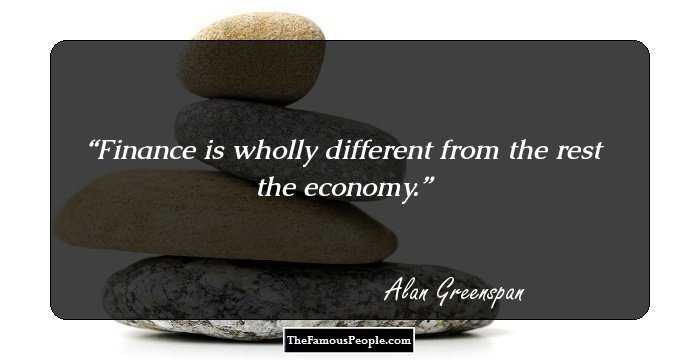
Finance is wholly different from the rest the economy.
I don't know where the stock market is going, but I will say this, that if it continues higher, this will do more to stimulate the economy than anything we've been talking about today or anything anybody else was talking about.
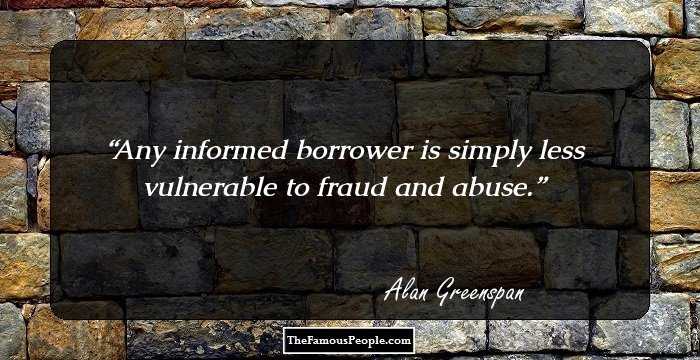
Any informed borrower is simply less vulnerable to fraud and abuse.
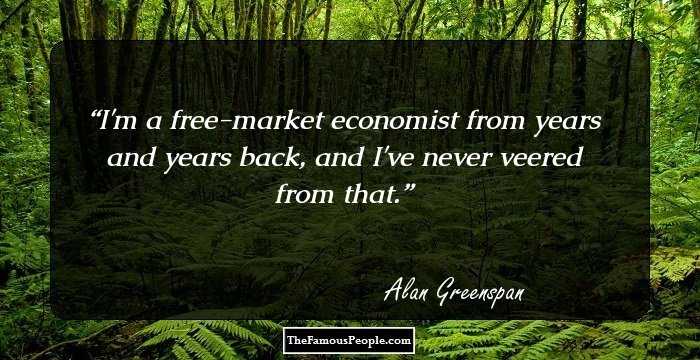
I'm a free-market economist from years and years back, and I've never veered from that.
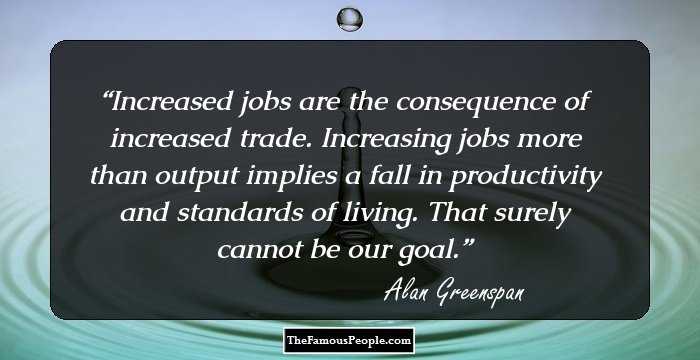
Increased jobs are the consequence of increased trade. Increasing jobs more than output implies a fall in productivity and standards of living. That surely cannot be our goal.
If somebody had said to me in June or July of 1987, 'We'd like you to become chairman of the Federal Reserve, but you're never allowed to discuss any economics after you leave,' I'd have said, 'Forget it.' What do they want me to do? Become an anthropologist?'

Crony capitalism is essentially a condition in which... public officials are giving favours to people in the private sector in payment of political favours.
Fear and euphoria are dominant forces, and fear is many multiples the size of euphoria. Bubbles go up very slowly as euphoria builds. Then fear hits, and it comes down very sharply. When I started to look at that, I was sort of intellectually shocked. Contagion is the critical phenomenon which causes the thing to fall apart.

The person I liked the best was Gerald R. Ford. He was the most decent man in politics I ever had any relationships with.
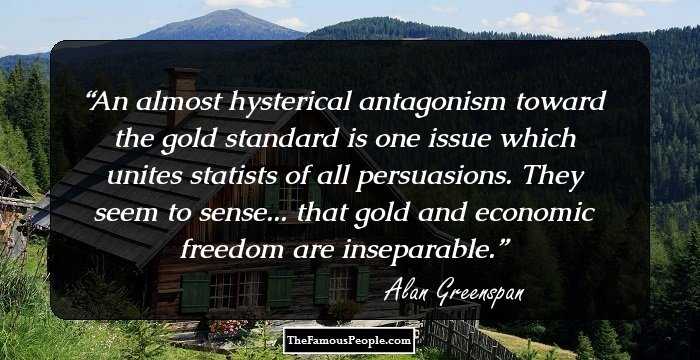
An almost hysterical antagonism toward the gold standard is one issue which unites statists of all persuasions. They seem to sense... that gold and economic freedom are inseparable.
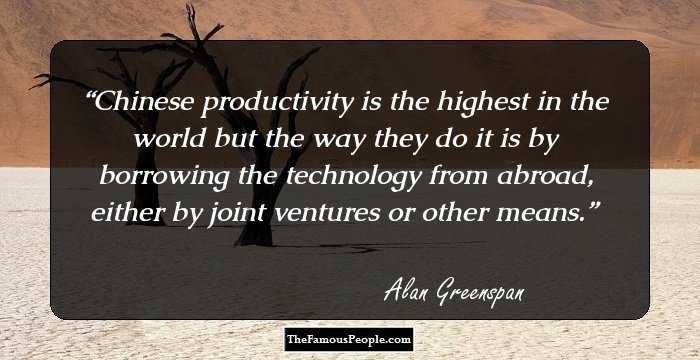
Chinese productivity is the highest in the world but the way they do it is by borrowing the technology from abroad, either by joint ventures or other means.

I guess I should warn you, if I turn out to be particularly clear, you've probably misunderstood what I've said.

I always believed in animal spirits. It's not their existence that is new. It's the fact that they are not random events, but actually replicate in-bred qualities of human nature which create those animal spirits.

To succeed, you will soon learn, as I did, the importance of a solid foundation in the basics of education - literacy, both verbal and numerical, and communication skills.
Every economy exists, no matter what the level of democracy, has elements of crony capitalism. It's - given human nature and given the democratic structures, which we all, I assume, adhere to, that is an inevitable consequence.

Unless you are willing to compromise, society cannot live together.

I get so engaged when I have a problem you cannot solve that I just cannot break away from what I am doing - I keep thinking and thinking and cannot stop.
The only way you get economic progress, real standards of living moving higher, is to have the savings of the society continuously invested in the cutting-edge technologies. And those technologies which are obsolescent get dropped out.

One of the problems with hedge funds is that they are changing so rapidly. If you have the balance sheet that closed business last night, by 11 A.M. this morning, that won't tell you very much about what they're doing.
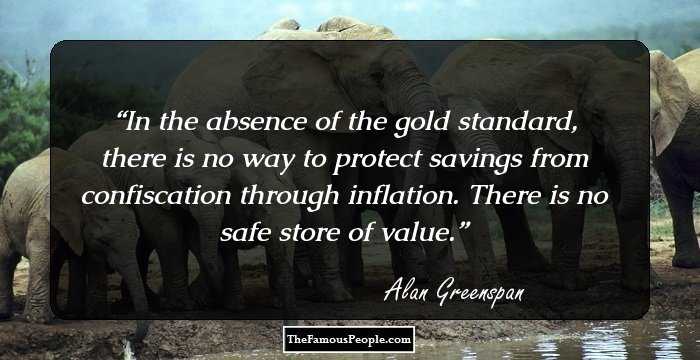
In the absence of the gold standard, there is no way to protect savings from confiscation through inflation. There is no safe store of value.
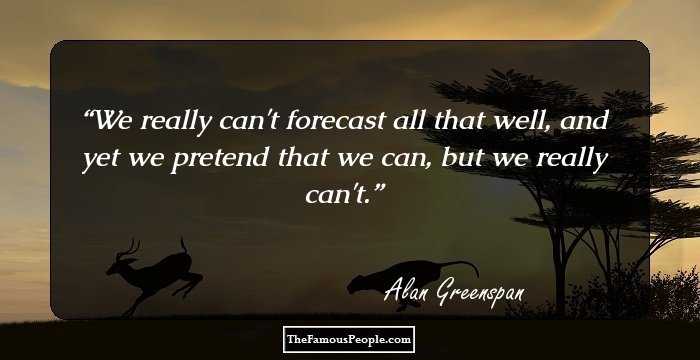
We really can't forecast all that well, and yet we pretend that we can, but we really can't.
Corruption, embezzlement, fraud, these are all characteristics which exist everywhere. It is regrettably the way human nature functions, whether we like it or not. What successful economies do is keep it to a minimum. No one has ever eliminated any of that stuff.

I have found no greater satisfaction than achieving success through honest dealing and strict adherence to the view that, for you to gain, those you deal with should gain as well.

Whatever you tax, you get less of.
I do not understand where the backing of Bitcoin is coming from. There is no fundamental issue of capabilities of repaying it in anything which is universally acceptable, which is either intrinsic value of the currency or the credit or trust of the individual who is issuing the money, whether it's a government or an individual.
I stated that I'm a libertarian Republican, which means I believe in a series of issues, such as smaller government, constraint on budget deficits, free markets, globalization, and a whole series of other things, including welfare reform.
Most high-income people in our country do not realize that their incomes are being subsidized by their protection from competition from highly skilled people who are prevented from immigrating to the United States. But we need such skills in order to staff our productive economy, so that the standard of living for Americans as a whole can grow.
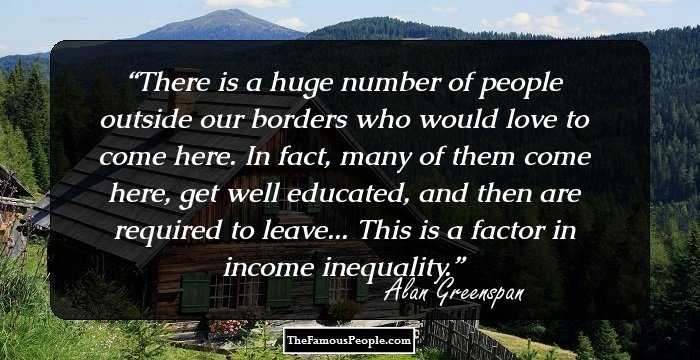
There is a huge number of people outside our borders who would love to come here. In fact, many of them come here, get well educated, and then are required to leave... This is a factor in income inequality.










